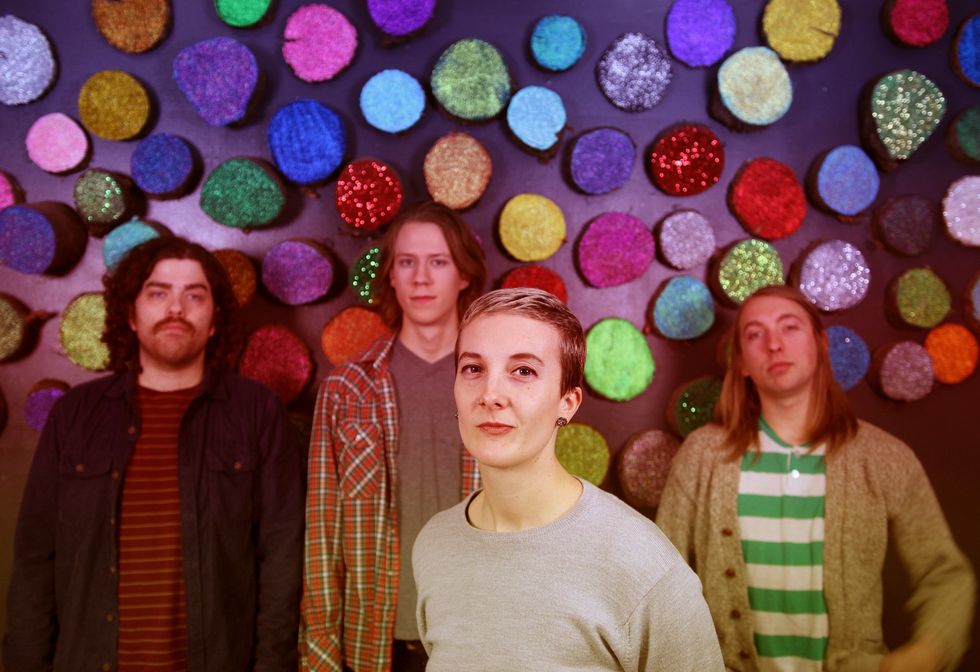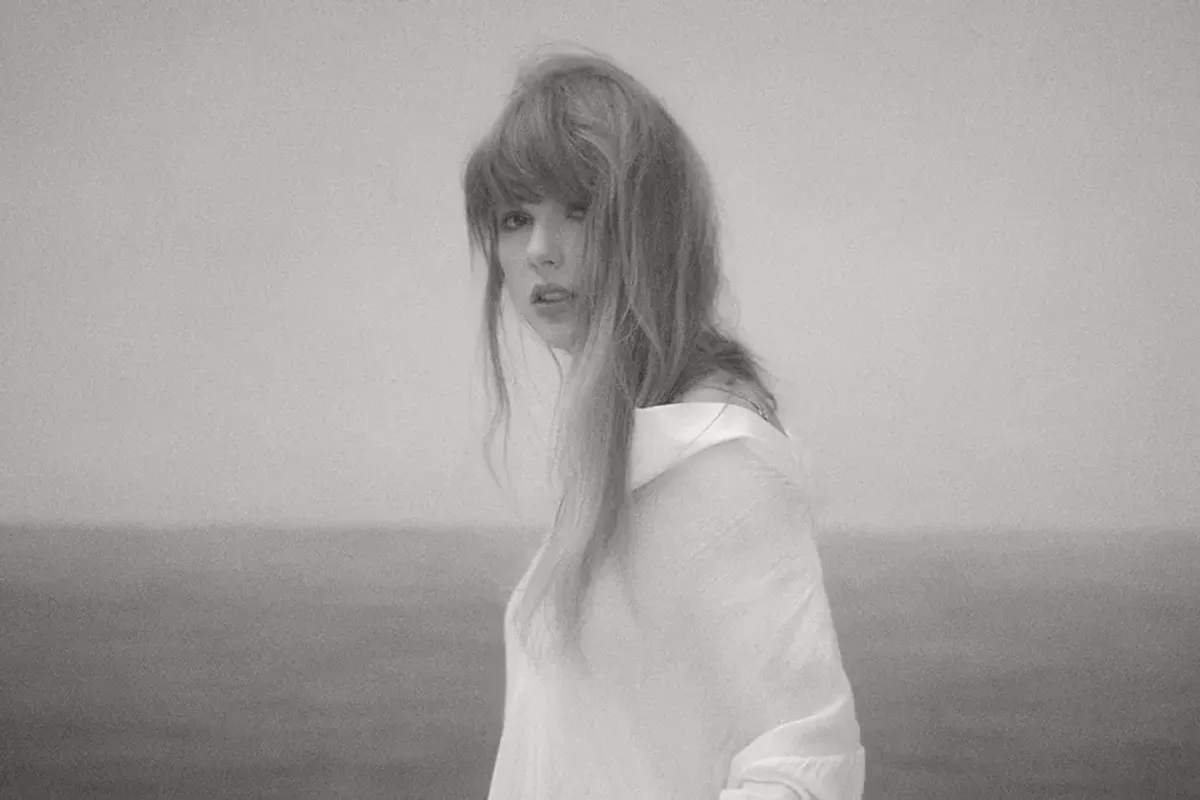Five Questions With… Hyness
This new noise-pop combo from Kitchener-Waterloo is quickly turning ears. In this interview, they discuss their origins, influences, and the commodification of art.

By Jason Schneider
Hyness, a four-piece band fronted by singer/guitarists Marcus and Amy Addams, draws inspiration primarily from the glorious fuzz that defined the first half of the 1990s– and the group’s debut EP, The End Of Music, is poised to immediately insert them into the conversation about Canada’s most promising new alt-rock bands.
Based in Kitchener-Waterloo, Hyness came to life in early 2017 out of discussions Marcus (also a member of power-pop outfit Teen Violence) and Amy had been having long before that about a project they could collaborate on. After forging a musical vision out of singing Raveonettes and Everly Brothers songs together, the couple quickly amassed some original demos and recruited drummer Colin White and bassist Dan Honsberger. Wanting to capture the raw energy of their new configuration, in August 2017 Hyness set up at Waterloo’s Starlight Club and recorded The End Of Music over two days with engineer Joe Shugan.
The Addams’ cite legendary Scottish bands like The Jesus And Mary Chain and the Vaselines as primary influences. They’ve developed an even closer connection to that world through their friendship with Teenage Fanclub’s Norman Blake, who moved from Glasgow to Kitchener with his family several years ago.
The combination of blissful vocals and raw power those bands are best known for likewise form the foundation of Hyness’ approach and The End Of Music is just the first taste of hopefully much more to come. Three of the four members took time to chat about their progress to date ahead of their anticipated return to the Starlight Club in Waterloo on Sunday, Feb. 18. You can hear more at hyness.bandcamp.com
How did this band come together?
Marcus Addams: Amy and I had our respective bands over the years and one day while talking, we discovered we shared a healthy amount of similar musical interests. We started wondering where the new bands were that had been listening to the same music as us. We couldn’t think of any that were combining the sounds we wanted to hear, so the obvious thing to do was to start that band. It was theoretical at first and resulted in us mostly playing a lot of covers. We learned to sing and perform together through that and soon after began to write songs and search for co-conspirators. Colin and Dan were pivotal in that they both have an incredible musical aptitude but are also the spirit of the band. They are the badass rock ‘n rollers.
As mentioned, your sound has a lot of strong ‘90s influences. What makes that period in music special to you?
Marcus Addams: The influences in our sound feel very traditional to me because it's largely indicative of what was around when I was growing up. I used to be a devoted Much Music viewer, waiting for it to break the next band. A lot of pivotal moments in my youth were influenced by catching a Refused or Black Rebel Motorcycle Club video. In a way, this band is a tribute to these little sonic epiphanies.
Amy Addams: I can't deny an inherent bias because of listening to a lot of this music during a formative period of my life, but I still wonder if this kind of music from the ‘90s held a certain spirit that is lacking today. Our favourite music was expressive in nature by being loud, full of attitude, rebelliousness and fuzz. It was also melancholy, and yet so energetic. Rock ‘n roll reigned, and listening to music made you feel cool, even if you weren't. You just wanted to be a part of it, and I miss that.
Dan Honsberger: My earliest influences were ‘90s alternative music via the Big Shiny Tunes compilations. Eventually, I got into Green Day and skate punk bands like NOFX and Operation Ivy, which opened the doors for '80s hardcore punk and two-tone ska. Later in high school, I got into the '90s jam band scene, with bands like moe., Phish, The Derek Trucks Band, and Umphrey's McGee. I fell in love with the reckless abandon of improvised shows.
Which of your songs means the most to you and why?
Amy Addams: I'm loving all the material we have come up with thus far, and we have written more since finishing the EP. However, “Choke” has a special value to me because it's the first original song that Marcus and I worked on together with this project's development in mind. The result solidified for us that together we could create music that genuinely and deeply satisfied our joint vision. It was an exciting glimpse into a vast potential. “Choke” seems to have a certain accessibility, as it has taken on its own role as the gateway into our music.
Dan Honsberger: Definitely “Choke.” It was the first song that I heard by the band, and it sold me on everything instantly.
What song by another artist do you wish you had written?
Amy Addams: Talking current songs, “I Believe You” by Vancouver's Dead Soft is one we wish we had written. It's got a vibe we appreciate, not to mention that it wallopped me the first time I heard it—and then the next 50 or so times. It's overflowing with emotion, so much so that it makes my heart ache, and the lyrics are poignant, bittersweet and intelligent. It makes me feel a way that I haven't felt towards a song in a very long time.
If there is anything you could change about the music business, what would it be?
Amy Addams: Oh boy! In short, it would be that money is paid to the artists and musicians in a fair manner for the consumption and enjoyment of their creations, so that they can continue to keep creating. There are all these businesses built on the backs of art and artists, with too many hands in the pockets of the creator. Often, creators are bled dry by the people and businesses that make claims to be furthering their careers. Creation of music or art seems to be more and more like a side-stage act, with the main event being the products corporations can sell at the show. The main focus is selling garbage and making money. Music and art in their pure form offer incredible sources of emotional connection to ourselves, others and our world. It's no doubt a reflection of our current culture of disposability and the commodification of pretty much anything possible.
Dan Honsberger: I wish more people bothered about where their music came from, supported local bands and overall just cared more to keep refreshing the old guard.

















